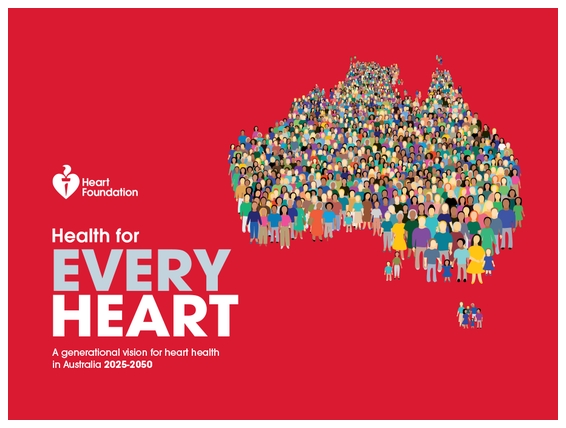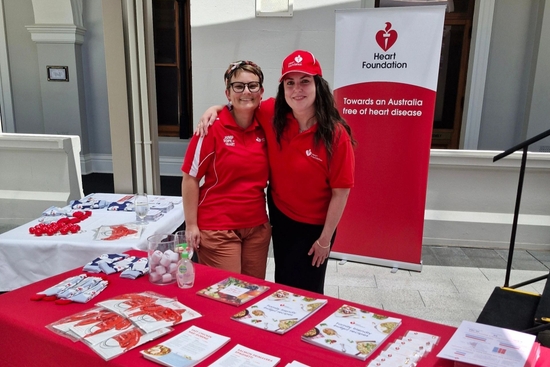
Heart health submissions to Government
Every day we are advocating to government and industry to improve heart health.
We aim to address disparities in heart health so all Australians can live longer, healthier lives. Every day we are making the case to governments and industry for action to improve heart health.
Below is some of our current advocacy work.
2025
Australian Centre for Disease Control Bill 2025
The Heart Foundation strongly supports the establishment of an Australian Centre for Disease Control (CDC) to strengthen Australia’s national health capability. However, we urge the Australian Government to prioritise both infectious and chronic diseases from day one of the centre’s operations.
Chronic conditions remain the leading causes of death, disability, and health system cost in Australia affecting at least half of the Australian population.
To ensure that national health responses are informed by both communicable (infectious) and non-communicable (chronic) diseases, as well as their interactions, the Heart Foundation recommends that the new Australian CDC:
- Prioritises non-communicable diseases from inception of the CDC, removing the proposed multi-year delay.
- Invests in integrated approaches to disease control in the CDC’s national data, surveillance and research.
- Embeds health equity strategies in all CDC activities including data collection, program design and public health messaging to ensure that the CDC can benefit everyone in Australia.
Read our submission to the Senate Inquiry here.
2025 Federal Election Submission
The Heart Foundation urges all parties and candidates to support the Heart Foundation's evidence-based plan to save lives and reduce preventable cardiovascular deaths.
Key priorities in our election statement include:
- $11.4–$15.5 million over three years to fully fund and expand the National Walking Initiative through community groups and personalised plans;
- $50.1–$90.6 million over six years to scale up the Remote Laundries Project, improving hygiene and reducing RHD in remote First Nations communities;
- $5 million over three years to boost Heart Health Check uptake through public campaigns and new delivery models.
Read our 2025 Federal Election Statement.
Federal Budget Submission 2025-26
With over four million Australians living with a cardiac condition, the future health of the nation is at risk without urgent intervention. Every year
- Cardiovascular disease is the underlying cause of 1 in 4 deaths in Australia
- 45,000 people die from cardiovascular disease
- Nearly 570,000 are hospitalised due to cardiovascular disease
- Cardiovascular diseases costs governments across Australia $12.7 billion
The Heart Foundation calls on the Australian Government to prioritise the future heart health of the nation by making the following investments:
- Get Australia Moving through the National Walking Initiative – $11.4 to $15.5 million over three years:
- A free to participate program that gets Australia moving again through community walking groups and individual personalised walking plans.
- Remote Laundries Project: Community led laundries to help end Rheumatic Heart Disease – $50.1 to $90.6 million over six years:
- Developing laundry facilities across remote Indigenous communities to reduce incidence of scabies, help bring an end to rheumatic heart disease, as well as supporting local job creation.
- Strengthening Medicare through cardiovascular disease prevention – $5 million over three years:
- Making the Medicare Heart Health Check permanent and expanding practice nurse and nurse practitioner scope of practice to increase delivery.
- Community Outreach Campaign: Investing $5 million in public awareness and primary healthcare recall programs.
Health Star Rating system and Nutrition Label Information
Food Standards Australia New Zealand (FSANZ) is progressing work on nutrition labelling to better support consumers to make informed healthy food choices. The Heart Foundation welcomes the opportunity to share evidence and information with FSANZ to help inform their work on front and back-of-pack nutrition labelling, including the Health Star Rating (HSR) system and the nutrition information panel (NIP).
Read the Heart Foundation's response to FSANZ's call for information.
Tobacco, e-cigarettes and vaping control
There are more than 20,000 deaths each year caused by smoking. The Heart Foundation champions measures that make smoking and the use of e-cigarettes and vaping products less appealing.
You can read more about our recent submissions and representations to governments here.
2024
Health impacts of alcohol and other drugs in Australia
Harmful use of alcohol and other drugs severely impacts the health and wellbeing of the individual, families and communities in Australia. It also affects our economy, health system and justice system, and contributes to inequity for many people in Australia.
Read the Heart Foundation’s submission to the House of Representatives Standing Committee on Health, Aged Care and Sport’s inquiry on the health impacts of alcohol and other drug use in Australia.
Improving commercial foods for infants and toddlers
The Heart Foundation welcomes the Food Regulation Standing Committee's initiative to improve commercial foods for infants and young children. We support policy options that would impose greater regulations on the composition and labelling of commercial infant and toddler foods in Australia.
Read the Heart Foundation's submission to the Australian Government Department of Health and Aged Care's public consultation on improving commercial foods for infants and toddlers.
Infrastructure and Transport Net Zero Roadmap
The Heart Foundation broadly supports the ambitions set out in the Consultation Roadmap to achieve net zero by 2050. Our comments primarily relate to objectives set out in the Consultation Roadmap towards rethinking transport networks and systems to promote active and public transport.
Read our submission on the Transport and Infrastructure Net Zero Consultation Roadmap here.
Limiting unhealthy food marketing to children
Exposure to marketing for unhealthy foods and drinks can significantly influence food intake, choices and preferences. Children are especially at risk of being influenced because they are at an important stage in life where they develop habits that often last into adulthood.
Read the Heart Foundation’s submission to the Australian Government Department of Health and Aged Care’s feasibility study on options to limit unhealthy food marketing to children.
National Urban Policy
The Heart Foundation supports the draft National Urban Policy’s clear recognition of the role of urban environments to support community health and wellbeing. We further note the interconnectedness of the Policy’s goals, objectives and principles, and the stated need for a holistic approach to achieve the ambitions and framework set out in the National Urban Policy.
Read the Heart Foundation’s submission to the draft National Urban Policy here.
2023
Senate Committee Inquiry into the Extent and Nature of Poverty in Australia
The medical research literature shows that there are clear links between poverty and health outcomes and across a range of different areas including food security, energy affordability, indigenous status, and the health impacts of climate change. People living in poverty are more likely to have adverse cardiovascular health outcomes, and this relationship is bidirectional, as those living with cardiovascular health conditions are more likely to be living in poverty.
The Heart Foundation contends that addressing the causes of poverty has the potential to improve the cardiovascular health of millions of Australians, and that by helping people to improve their cardiovascular health they are less likely to find themselves trapped in poverty.
The Heart Foundation has made the following recommendations to the Committee:
- The Australian Government should continue to provide timely and affordable access to Heart Health Checks by extending MBS items 699 and 177.
- Honest and transparent labelling of food, a mandatory Health Star Rating system, and stronger reformulation targets achieved through the Healthy Food Partnership.
- The Australian Dietary Guidelines are routinely updated, and national nutrition surveys are undertaken at regular intervals.
- A National Nutrition Strategy is developed and implemented, focusing on equitable access to fresh, healthy and sustainable foods.
- Policies developed to ensure that everybody, irrespective of their economic circumstances and where they live, has access to healthy food.
- Incorporate active living in our built environment (such as the initiatives outlined in the Heart Foundation’s Healthy Active by Design program).
- Continued government investment in low-cost and no-cost physical exercise activities (such as the Heart Foundation’s Walking Program), particularly in areas of high need and poverty.
- Continued support and expansion of the Heart Foundation’s Active Australia Challenge to support more community-led programs in areas of poverty support increased physical activity.
- Continue Australia’s anti-tobacco initiatives.
- Provide additional assistance to those from lower socioeconomic groups to quit smoking.
- Continue policies to eliminate RHD in Australia, with a particularly focus on ending poverty amongst First Nations Communities
- Increased funding and commitment to implement the Rheumatic Heart Disease Endgame Strategy including those directly related to the socioeconomic outcomes and targets established under the new National Agreement on Closing the Gap.
- Support the ongoing delivery and expansion of community led peer support programs such as the Heart Foundation’s Champions4Change program that prioritise Aboriginal voices and leadership, decision making at all levels of the health system, the importance of developing community capacity, acknowledge the value of lived expertise and are locally responsive.
- Support the prevention, control and management of Rheumatic Heart Disease by making a notifiable disease in every State and Territory.
Submission to the Senate Community Affairs References Committee Poverty Inquiry
Smoking and tobacco control
Tobacco smoke is one of the main risk factors for heart disease and is responsible for 12% of the burden of cardiovascular disease in Australia.
Learn more about the work being done to end tobacco use in Australia.
Energy labelling on alcoholic beverages
Heart Foundation provided a submission to the Food Standards Australia New Zealand (FSANZ) proposal P1059 regarding energy labelling on alcoholic beverages.
Summary of the recommendations within our submission:
- FSANZ prohibits manufacturers to determine a ‘normal’ serving size of alcoholic beverages.
- FSANZ prescribe reference amounts to act as the basis for determining serving sizes. Self-served alcoholic beverages are to align with government messaging on serving sizes of standard drinks. For individual bottles or cans, which are intended to be consumed as a single serve, serving size is based on the entire contents.
- Mandatory energy labelling on alcoholic beverages be applied to online retail settings, including meal delivery services which are expanding to the provision of alcoholic beverages.
- Mandatory energy labelling be applied to both individual and outer layer packaging.
- Energy-related nutrient content claims on alcoholic beverages be included in P1049 which presently is limited to carbohydrate and sugar claims.
- Cost-benefit analysis is extended from overweight and obesity measures to include alcohol-related harms.
House Of Representatives inquiry into diabetes
Diabetes and its complications including kidney disease and obesity, are established risk factors for cardiovascular disease (CVD).
Read our submission to the House of Representatives Standing Committee on Health, Aged Care and Sport inquiry into diabetes.
2018
Economic Cost of High Cholesterol in Australia
The economic burden attributable to high cholesterol is $3.9 billion.
Read the full report:
Economic Cost of Acute Coronary Syndrome in Australia
The total economic cost of acute coronary syndrome (ACS), which includes heart attack and unstable angina, is $6.8 billion in 2017-18.
Read the full report:
You might also be interested in...

Health for Every Heart
The Heart Foundation has a 25-year vision for heart health in Australia

State based advocacy
Every day in each state and territory, we are advocating to government and industry to improve heart health.

Policymaker resources
Our free, downloadable resources can help you promote heart health in your community.
Last updated24 October 2025